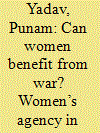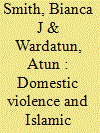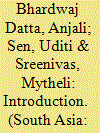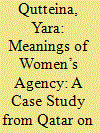|
|
|
Sort Order |
|
|
|
Items / Page
|
|
|
|
|
|
|
| Srl | Item |
| 1 |
ID:
182479


|
|
|
|
|
| Summary/Abstract |
This article examines current discourses on the role of the bridewealth in subordinating women and the implications of gender justice advocacy that privilege the undoing of this practice. In northern Ghana, to liberate women from oppression, some women’s rights activists advocate the abolition of the marriage payment. Drawing on ethnographic data gathered in north-western Ghana, we argue that dismantling the institution of the bridewealth risks worsening women’s subordination. Gender activism needs to be sensitive to contextual norms and respectful of the ‘oppressed’ subjects of ‘liberation’. We propose a return to the traditional court as a site for negotiating women’s emancipation.
|
|
|
|
|
|
|
|
|
|
|
|
|
|
|
|
| 2 |
ID:
178723


|
|
|
|
|
| Summary/Abstract |
Women’s agency in Peace and Conflict Studies has received increased policy attention since the formulation of UN Security Council Resolution in 2000. Academic attention regarding this question has, as a result, also increased dramatically in the intervening period. Women today, as a consequence, are not just seen as victims of conflict, but also as agents of change. Despite their vulnerabilities in the situations created by conflict, women may be exposed to new knowledge and opportunities, which may have positive impacts on their lives. Therefore, it is important to recognize the lived realities and the multiple stories of postwar societies to address the new needs of people and build a sustainable peace. This article examines the everyday lives of women in post-conflict Nepal to demonstrate the significant transformations that have taken place since the war. It specifically investigates conflict-induced social and structural changes through the lived experiences of women tempo drivers, war widows, women ex-combatants and women politicians. This article is based on the analysis of 200 interviews and six focus group discussions (FGDs) carried out over a period of 12 years in seven districts of Nepal.
|
|
|
|
|
|
|
|
|
|
|
|
|
|
|
|
| 3 |
ID:
188976


|
|
|
|
|
| Summary/Abstract |
This article argues that the Sufi practice of dhikr in combination with Quranic recitation and prayer can be understood as “hidden agency” Muslim women exercise in their mediation of violence and piety, particularly so in attempts at lessening their suffering of domestic violence. Our arguments indicate that women actively work towards employing a spiritual approach to their suffering that can be described as Sufi and that they exercise agency in an Islamic way that is bound by their connection with Allah. Our use of the term agency is therefore a nuanced one that is multidimensional and flexible in that it can expand and contract in different circumstances and is at the same time concerned with one’s embeddedness in Allah’s Divinity. This understanding of agency contrasts with normative sociological and feminist ones that see agency as a human’s capacity to act in response to social structures and power relations without necessarily allocating a dimension for an understanding rooted in Divinity. Based on anthropological fieldwork from 2017 to 2020 in Lombok, West Nusa Tenggara, Indonesia, we explore Muslim women in abusive marriages by engaging the notion of a pluralized agency that women exercise in an Islamic framework. The article further considers ethical tensions feminists face when working with women victims who do not live from a human rights understanding of domestic violence and instead focus on enhancing piety in response to suffering.
|
|
|
|
|
|
|
|
|
|
|
|
|
|
|
|
| 4 |
ID:
178861


|
|
|
|
|
| Summary/Abstract |
This Introduction frames a collection of papers that explore the roles played by women—as volunteers, organisers, bureaucrats, politicians and citizens—in shaping the emerging ideologies and structures of independent India. Although women’s participation is both understudied and inadequately theorised in existing scholarship, the papers in this collection demonstrate that the decades following India’s Independence witnessed the participation of women in every sphere of politics and nation-building. The introductory essay tracks the limits and possibilities of women’s agency and gendered citizenship in these spheres to historicise the women’s movement during the post-Independence decades, and to examine its fraught relationship with feminism, patriarchal society and state politics.
|
|
|
|
|
|
|
|
|
|
|
|
|
|
|
|
| 5 |
ID:
169444


|
|
|
|
|
| Summary/Abstract |
The measurement of women’s agency poses numerous challenges, including multi-dimensionality and context-specificity. This challenge is especially large for non-Western contexts that adapt measurement instruments without rigorous testing and comprehensive understanding of construct meanings in place. In this paper, we present a case study from Qatar where we investigate the face validity, comprehension and functionality of women’s agency scale items. Cognitive interviews were conducted with twenty-four women to capture their interpretations of decision-making, freedom-of-movement, and gender attitudes scale items. The majority of women originally reported that they made their own decisions; yet, further probing revealed otherwise. While women seemed to understand, as intended, the freedom-of-movement item, the items measuring gender attitudes were generally reflective of broader local societal norms rather than the women’s own opinions. This research highlights the need for deeper exploration into women’s understanding of an agency scale before its use in a new context.
|
|
|
|
|
|
|
|
|
|
|
|
|
|
|
|
|
|
|
|
|